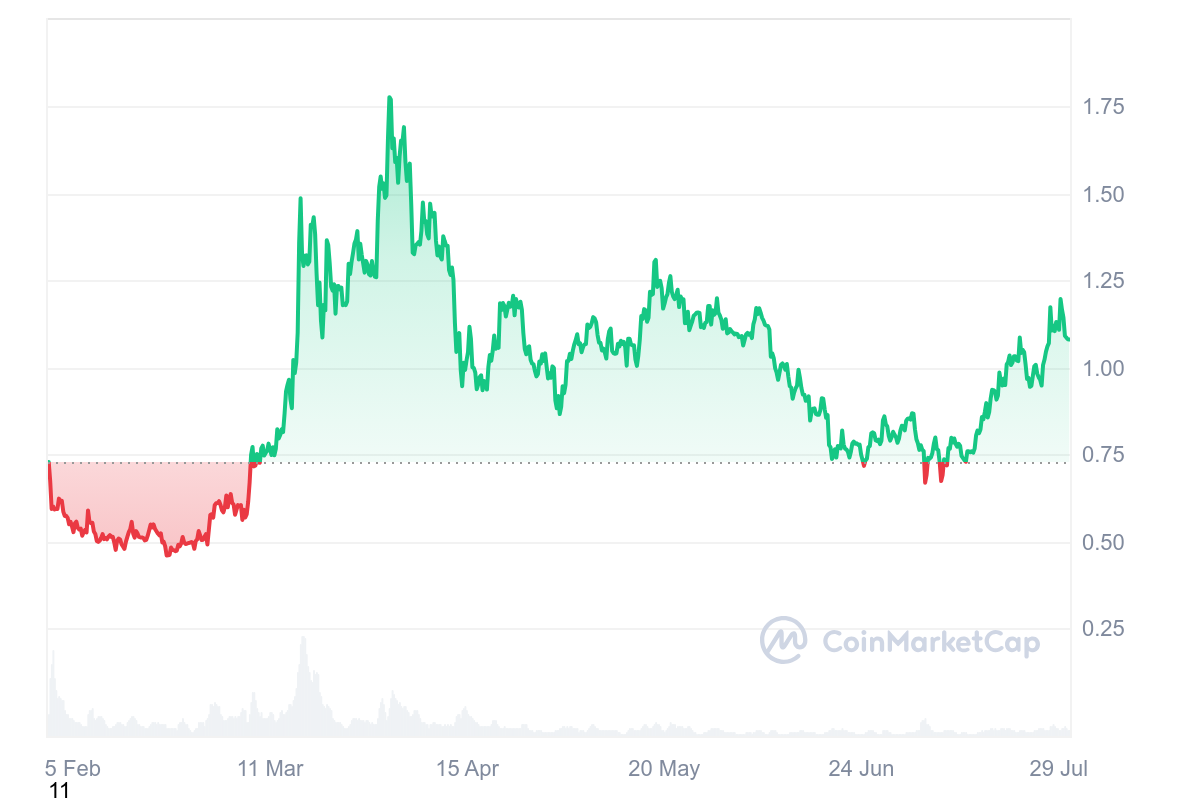What Is Jupiter on Solana and How Does it Work?
As liquidity remains fragmented on decentralised exchanges (DEXs) in the decentralised finance (DeFi) market, DEX aggregators like Jupiter offer an effective solution for users. This way, they can reduce slippage, as well as take advantage of increased liquidity and better prices for their swaps.
In this article, we will explain what Jupiter is and how it fits into the Solana ecosystem, along with exploring the JUP token and the platform's key features and services.
What Is Jupiter on Solana and How Does it Work?
Created by the pseudonymous "Meow," Jupiter is a Solana-based DEX aggregator that rolled out in October 2021. Since its launch, the project has evolved into a full-fledged DeFi ecosystem, offering a wide range of solutions – from perpetual trading to liquid staking.
At the core of its ecosystem is Jupiter Swap, the project's decentralised exchange aggregator. Designed to offer users the best rates for swapping Solana Program Library (SPL) tokens in the Solana ecosystem, the service ensures optimal prices, low slippage, and efficient transaction execution by routing trades through multiple liquidity sources.
Besides the benefits mentioned above, traders can also perform complex token swaps in a single transaction on Jupiter Swap. Moreover, they can take advantage of deep liquidity and a seamless interface for swapping digital assets.
As of July 30, 2024, Jupiter's DEX aggregator has a daily volume of nearly $335 million. In March, this volume reached $3.37 billion, which is an all-time high for the project.
What Are the Key Features and Services Within Jupiter's Ecosystem?
In addition to its DEX aggregator, Jupiter offers the following flagship services and features for DeFi users:
| Solution | Details |
|---|---|
| Perpetual Trading | Besides aggregating liquidity on other DEXs for the spot market, Jupiter also has a perpetuals exchange, where traders can use up to 100x leverage to amplify their positions. To enable margin trading, the decentralised exchange relies on Jupiter Liquidity Providers (JLPs), who supply liquidity for perpetual traders. |
| Bridge | With the Jupiter Bridge Comparator, users can compare multiple bridges and select their preferred solution to transfer assets to Solana from other chains. |
| Limit Orders | In addition to standard swaps, traders can also set up limit orders via Jupiter. Unlike with market orders, users can buy or sell a token pair with a specified price limit via limit orders. |
| Automated Strategies | Users can take advantage of two automated investment strategies on Jupiter: dollar-cost averaging (DCA) and value averaging (VA). With the former, investors invest the same amount of funds in an asset at regular intervals. Value averaging uses the same approach as DCA but with different amounts for each contribution to focus on equal portfolio growth instead of equal investments. |
| JupSOL | JupSOL is Jupiter's liquid staking token, which represents staked Solana (SOL) tokens with the project's validator (Triton). Jupiter passes all maximal extractable value (MEV) and validator rewards to stakers, charging only a 0.1% fee for SOL deposits. |
| Ape | Ape is Jupiter's platform for trading memecoins, featuring instant settlement. |
| LFG Launchpad | The LFG Launchpad is Jupiter's community-driven launchpad, which provides large-scale on-chain projects a reliable way to bootstrap their tokens within the Solana ecosystem. |
What Is the JUP Token and What Should Investors Know About its Tokenomics?
Launched in January 2024, the JUP token is Jupiter's native coin that allows holders to be in charge of the project's governance. According to the DEX aggregator's founder, the digital asset's utility is exclusive to shaping the protocol's future via the Jupiter decentralised autonomous organisation (DAO).
JUP's maximum supply is capped at 10 billion tokens, with its circulating supply currently standing at 1.35 billion coins. After its launch, the token was distributed equally between the core team and the community, featuring the following allocations:
20% – Current team members
20% – Strategic reserve
10% – Liquidity provision
40% – Four rounds of airdrops
10% – Contributors and grants
Source: CoinMarketCap
As of July 30, 2024, JUP has an all-time return on investment (ROI) of 48.4%. After rolling out in January 2024, its value surged from the initial $0.73 to as high as $1.77 before dropping to $1.08, the price it is currently trading at.
Buy Jupiter (JUP) on VALR
Jupiter is a leading DEX aggregator not just within the Solana ecosystem but in the broader DeFi market as well. By expanding its suite of offerings, the project has transformed into a full-fledged platform that provides users access to several different decentralised finance services.
Looking to gain exposure to Jupiter (JUP)? You can trade Jupiter on VALR's Simple Buy/Sell or on Spot market: JUP/USDT.
Frequently Asked Questions
-
Jupiter is a Solana-based decentralized exchange (DEX) aggregator that provides users with the best rates for swapping Solana Program Library (SPL) tokens by routing trades through multiple liquidity sources.
-
Jupiter crypto started in October 2021.
-
Jupiter coin (JUP) is used for governance within the Jupiter ecosystem, allowing holders to shape the protocol's future via the Jupiter decentralized autonomous organization (DAO).
-
No, Jupiter is not a stablecoin.
-
The maximum supply of JUP tokens is capped at 10 billion, with the circulating supply currently standing at 1.35 billion coins.
Risk Disclosure
Trading or investing in crypto assets is risky and may result in the loss of capital as the value may fluctuate.
VALR (Pty) Ltd is a licensed financial services provider (FSP #53308).
Disclaimer: Views expressed in this article are the personal views of the author and should not form the basis for making investment decisions, nor be construed as a recommendation or advice to engage in investment transactions.


